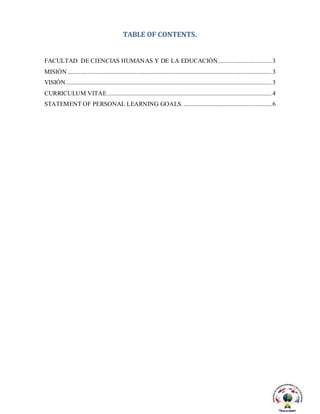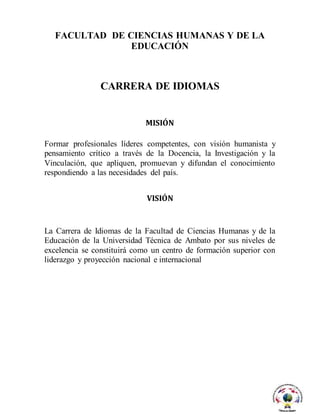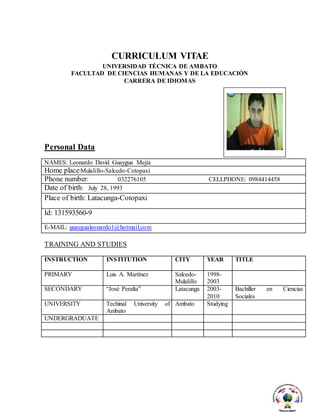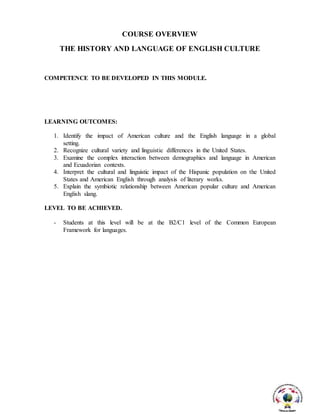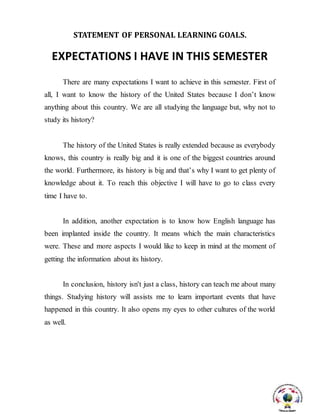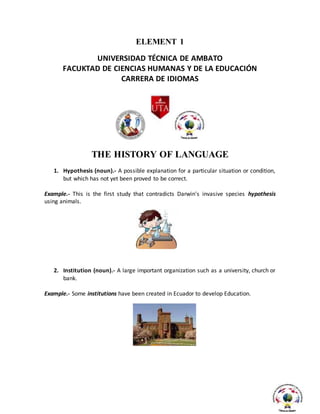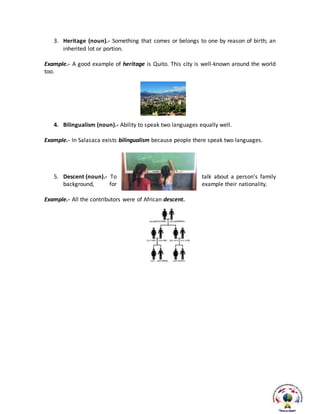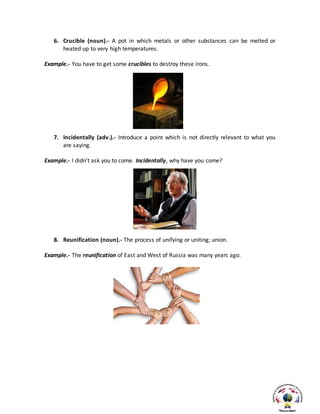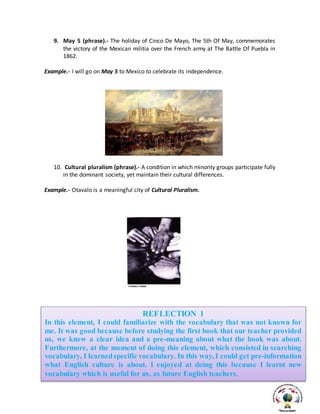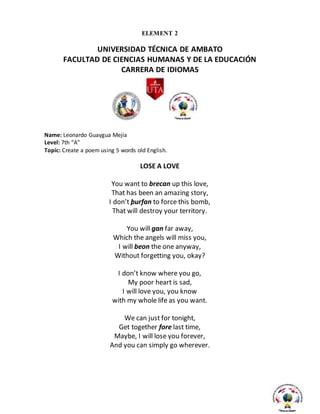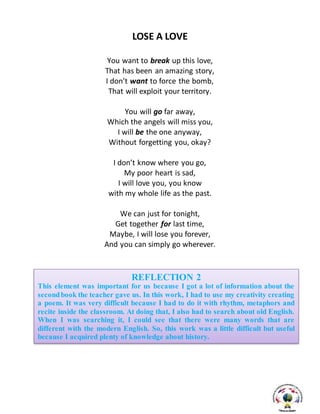History portfolio
- 1. UNIVERSIDAD TÃCNICA DE AMBATO FACULTAD DE CIENCIAS HUMANAS Y DE LA EDUCACIÃN CARRERA DE IDIOMAS MODALIDAD PRESENCIAL PORTFOLIO âThe History and Language of English Cultureâ SÃĐptimo Semestre Estudiante: Leonardo Guaygua MejÃa Profesor: Lcda. Mg. AngÃĐlica Velasteguà AMBATO - ECUADOR Octubre-Marzo 2014
- 2. TABLE OF CONTENTS. FACULTAD DE CIENCIAS HUMANAS Y DE LA EDUCACIÃN..................................3 MISIÃN ..................................................................................................................................3 VISIÃN...................................................................................................................................3 CURRICULUM VITAE.........................................................................................................4 STATEMENT OF PERSONAL LEARNING GOALS. ........................................................6
- 3. FACULTAD DE CIENCIAS HUMANAS Y DE LA EDUCACIÃN CARRERA DE IDIOMAS MISIÃN Formar profesionales lÃderes competentes, con visiÃģn humanista y pensamiento crÃtico a travÃĐs de la Docencia, la InvestigaciÃģn y la VinculaciÃģn, que apliquen, promuevan y difundan el conocimiento respondiendo a las necesidades del paÃs. VISIÃN La Carrera de Idiomas de la Facultad de Ciencias Humanas y de la EducaciÃģn de la Universidad TÃĐcnica de Ambato por sus niveles de excelencia se constituirÃĄ como un centro de formaciÃģn superior con liderazgo y proyecciÃģn nacional e internacional
- 4. CURRICULUM VITAE UNIVERSIDAD TÃCNICA DE AMBATO FACULTAD DE CIENCIAS HUMANAS Y DE LA EDUCACIÃN CARRERA DE IDIOMAS Personal Data NAMES: Leonardo David Guaygua MejÃa Home place:Mulalillo-Salcedo-Cotopaxi Phone number: 032276105 CELLPHONE: 0984414458 Date of birth: July 28, 1993 Place of birth: Latacunga-Cotopaxi Id: 131593560-9 E-MAIL: guaygualeonardo1@hotmail.com TRAINING AND STUDIES INSTRUCTION INSTITUTION CITY YEAR TITLE PRIMARY Luis A. MartÃnez Salcedo- Mulalillo 1998- 2003 SECONDARY âJosÃĐ Peraltaâ Latacunga 2003- 2010 Bachiller en Ciencias Sociales UNIVERSITY Techinal University of Ambato Ambato Studying UNDERGRADUATE
- 5. COURSE OVERVIEW THE HISTORY AND LANGUAGE OF ENGLISH CULTURE COMPETENCE TO BE DEVELOPED IN THIS MODULE. LEARNING OUTCOMES: 1. Identify the impact of American culture and the English language in a global setting. 2. Recognize cultural variety and linguistic differences in the United States. 3. Examine the complex interaction between demographics and language in American and Ecuadorian contexts. 4. Interpret the cultural and linguistic impact of the Hispanic population on the United States and American English through analysis of literary works. 5. Explain the symbiotic relationship between American popular culture and American English slang. LEVEL TO BE ACHIEVED. - Students at this level will be at the B2/C1 level of the Common European Framework for languages.
- 6. STATEMENT OF PERSONAL LEARNING GOALS. EXPECTATIONS I HAVE IN THIS SEMESTER There are many expectations I want to achieve in this semester. First of all, I want to know the history of the United States because I donât know anything about this country. We are all studying the language but, why not to study its history? The history of the United States is really extended because as everybody knows, this country is really big and it is one of the biggest countries around the world. Furthermore, its history is big and thatâs why I want to get plenty of knowledge about it. To reach this objective I will have to go to class every time I have to. In addition, another expectation is to know how English language has been implanted inside the country. It means which the main characteristics were. These and more aspects I would like to keep in mind at the moment of getting the information about its history. In conclusion, history isn't just a class, history can teach me about many things. Studying history will assists me to learn important events that have happened in this country. It also opens my eyes to other cultures of the world as well.
- 7. ELEMENT 1 UNIVERSIDAD TÃCNICA DE AMBATO FACUKTAD DE CIENCIAS HUMANAS Y DE LA EDUCACIÃN CARRERA DE IDIOMAS THE HISTORY OF LANGUAGE 1. Hypothesis (noun).- A possible explanation for a particular situation or condition, but which has not yet been proved to be correct. Example.- This is the first study that contradicts Darwin's invasive species hypothesis using animals. 2. Institution (noun).- A large important organization such as a university, church or bank. Example.- Some institutions have been created in Ecuador to develop Education.
- 8. 3. Heritage (noun).- Something that comes or belongs to one by reason of birth; an inherited lot or portion. Example.- A good example of heritage is Quito. This city is well-known around the world too. 4. Bilingualism (noun).- Ability to speak two languages equally well. Example.- In Salasaca exists bilingualism because people there speak two languages. 5. Descent (noun).- To talk about a personâs family background, for example their nationality. Example.- All the contributors were of African descent.
- 9. 6. Crucible (noun).- A pot in which metals or other substances can be melted or heated up to very high temperatures. Example.- You have to get some crucibles to destroy these irons. 7. Incidentally (adv.).- Introduce a point which is not directly relevant to what you are saying. Example.- I didnât ask you to come. Incidentally, why have you come? 8. Reunification (noun).- The process of unifying or uniting; union. Example.- The reunification of East and West of Russia was many years ago.
- 10. 9. May 5 (phrase).- The holiday of Cinco De Mayo, The 5th Of May, commemorates the victory of the Mexican militia over the French army at The Battle Of Puebla in 1862. Example.- I will go on May 5 to Mexico to celebrate its independence. 10. Cultural pluralism (phrase).- A condition in which minority groups participate fully in the dominant society, yet maintain their cultural differences. Example.- Otavalo is a meaningful city of Cultural Pluralism. REFLECTION 1 In this element, I could familiarize with the vocabulary that was not known for me. It was good because before studying the first book that our teacher provided us, we knew a clear idea and a pre-meaning about what the book was about. Furthermore, at the moment of doing this element, which consisted in searching vocabulary, I learnedspecific vocabulary. In this way, I could get pre-information what English culture is about. I enjoyed at doing this because I learnt new vocabulary which is useful for us, as future English teachers.
- 11. ELEMENT 2 UNIVERSIDAD TÃCNICA DE AMBATO FACULTAD DE CIENCIAS HUMANAS Y DE LA EDUCACIÃN CARRERA DE IDIOMAS Name: Leonardo Guaygua MejÃa Level: 7th âAâ Topic: Create a poem using 5 words old English. LOSE A LOVE You want to brecan up this love, That has been an amazing story, I donât Ãūurfan to force this bomb, That will destroy your territory. You will gan far away, Which the angels will miss you, I will beon the one anyway, Without forgetting you, okay? I donât know where you go, My poor heart is sad, I will love you, you know with my whole life as you want. We can just for tonight, Get together fore last time, Maybe, I will lose you forever, And you can simply go wherever.
- 12. LOSE A LOVE You want to break up this love, That has been an amazing story, I donât want to force the bomb, That will exploit your territory. You will go far away, Which the angels will miss you, I will be the one anyway, Without forgetting you, okay? I donât know where you go, My poor heart is sad, I will love you, you know with my whole life as the past. We can just for tonight, Get together for last time, Maybe, I will lose you forever, And you can simply go wherever. REFLECTION 2 This element was important for us because I got a lot of information about the secondbook the teacher gave us. In this work, I had to use my creativity creating a poem. It was very difficult because I had to do it with rhythm, metaphors and recite inside the classroom. At doing that, I also had to search about old English. When I was searching it, I could see that there were many words that are different with the modern English. So, this work was a little difficult but useful because I acquired plenty of knowledge about history.

